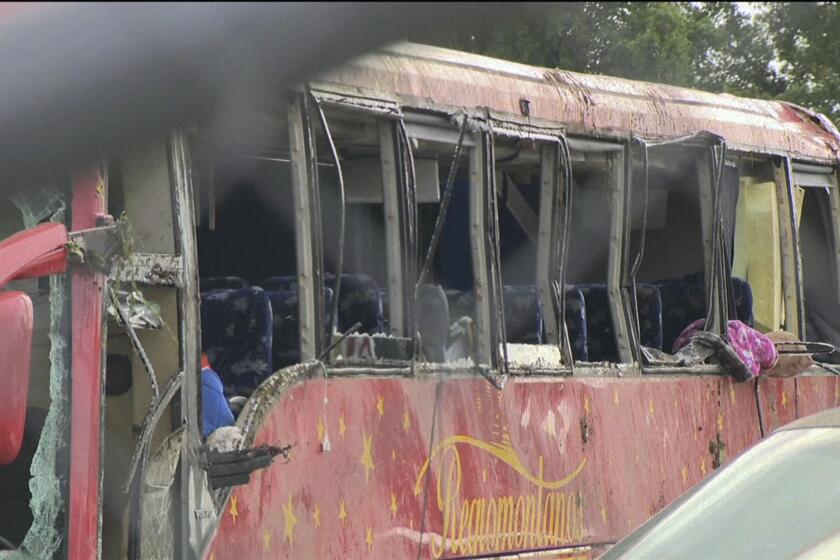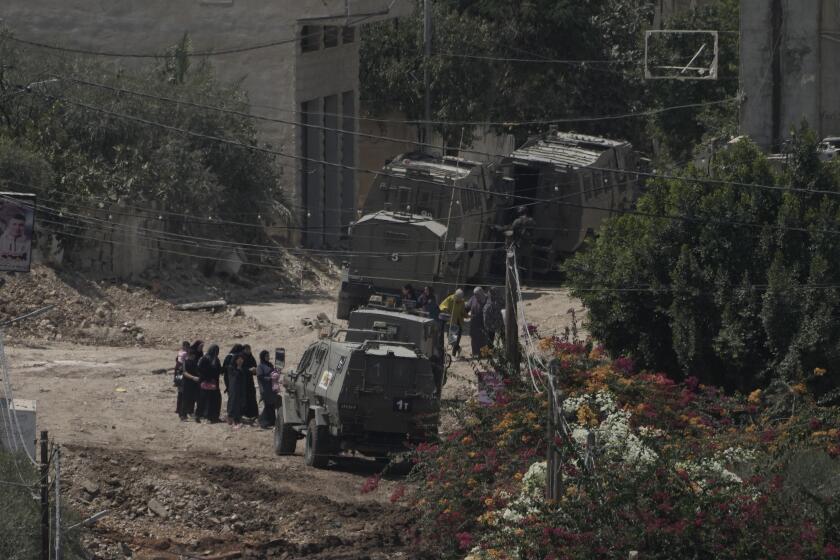U.S. Officials Dismayed by Gorbachev Appointments : Shake-up: Replacements are called worse than those ousted. Gen. Moiseyev heads the Defense Ministry.
Soviet President Mikhail S. Gorbachev, in naming his first replacements for the engineers of the failed coup, has chosen senior government officers who appear to be representatives of the Communist Old Guard rather than apostles of reform, according to U.S. analysts.
U.S. officials voiced disappointment at the choices, interpreting them as either place-holders in a period of transition or a sign of Gorbachev’s continued unwillingness to fully embrace the reform agenda.
The new heads of the Soviet military, the KGB and the Interior Ministry all had been trusted deputies to ringleaders of the botched coup.
“These people are worse than the people they are replacing,” complained one State Department official.
Gen. Mikhail A. Moiseyev, whose role during the coup remains murky, was elevated from chief of the general staff to defense minister, replacing coup plotter Marshal Dmitri T. Yazov, his mentor and sponsor in the military.
Moiseyev, 52, is known in the West as energetic and articulate, having recently appeared on ABC’s “Nightline” chatting with his American counterpart, Gen. Colin L. Powell, chairman of the Joint Chiefs of Staff.
But Moiseyev also is considered anti-reform, and he supported the harsh crackdowns on independence demonstrators in Georgia and Lithuania earlier this year.
The new KGB chief, Leonid V. Shebarshin, 56, was until Thursday head of the spy agency’s First Chief Directorate, in charge of gathering foreign intelligence and conducting covert overseas operations.
Shebarshin, described by U.S. analysts as well-educated and cosmopolitan, is a longtime associate of ousted KGB boss Vladimir A. Kryuchkov, who U.S. officials believe was the driving force behind the coup attempt.
Shebarshin served as the KGB’s senior agent in India and Iran before returning to Moscow in the early 1980s to a series of high-level posts.
The least known of the new appointees is Vasily P. Trushin, who takes over the Soviet Interior Ministry from Boris K. Pugo, another of the coup plotters.
A longtime senior Communist Party official and police administrator, Trushin, 56, ran afoul of Boris N. Yeltsin last summer, shortly after Yeltsin was elected head of the Russian Federation Parliament. Yeltsin fired Trushin as head of the Russian Interior Ministry, but he quickly moved into the Kremlin as Pugo’s deputy at the Soviet Interior Ministry, known by the initials MVD.
U.S. officials voiced hope that the appointments would prove to be temporary and that Gorbachev, with the counsel and consent of Yeltsin, eventually would appoint new deputies untainted by association with hard-line policies.
Nonetheless, the initial Administration reaction was one of surprise and dismay that Gorbachev had chosen continuity over change.
“Unfortunately, the nature of the appointments appears to indicate that Gorbachev has learned little from his recent captivity and that he is still more determined to reconcile with the Old Guard than to embrace the new,” according to an analysis by Radio Free Europe/Radio Liberty, which closely follow events and personalities in the Soviet Union.
“For the time being, both (Yeltsin) and Gorbachev, perhaps, are more interested in promoting stability than in punishing those associated with the coup.” Gabriel Shoenfeld, senior Soviet affairs analyst at the Center for Strategic and International Studies in Washington, put it more bluntly: “Gorbachev is blowing a golden opportunity. He needs to do a house-cleaning. Instead, he’s playing musical chairs.
“It is very difficult to understand this choice of men,” he said. “It really is. It suggests a total incomprehension of what’s happened.”
Gen. Moiseyev
Moiseyev was born in 1939 in Siberia into a working-class family and joined the army in 1958 and the Communist Party in 1962, according to official biographies. He graduated first in his class at the Frunze Military Academy in 1972 and the Military Academy of the General Staff 10 years later.
He achieved senior rank quickly by identifying powerful mentors and rising with them. He hitched his star to Yazov and served as his deputy as commander of the Far East Military District, which covers Siberia, the Chinese border region and the Soviet Pacific coast. He became commander of the district in 1987, when Yazov became defense minister. A year later, Yazov brought Moiseyev back to Moscow as chief of staff, the youngest officer ever to hold the post and the first since 1945 not to have fought in World War II.
A U.S. government assessment of Moiseyev said his appointment as chief of staff signaled a downgrading of the position because he was neither a respected troop commander nor a leading military theorist.
“He’s considered a younger, more pragmatic, staff-oriented person” than his predecessors, said a senior Soviet military specialist at the Pentagon. “He made his name predominantly as a staff officer and relatively junior commander.
“We believe he’s more representative of the up-and-coming postwar generation of senior officers,” the analyst continued. “As a result, we think he is more attuned to developments of new technology, better training and advanced computers than an older marshal would be. But there’s widespread contempt in the military by junior officers for anyone with rank of colonel and above. They are thought to be out of touch with reality.”
While Moiseyev is younger than most senior leaders in the Soviet military, he shares many of their fears about domestic disintegration, U.S. officials believe.
The Radio Free Europe/Radio Liberty analysis said that Moiseyev has emerged as an outspoken opponent of Gorbachev’s reform policies and has criticized independence movements in the non-Russian republics.
“He has also criticized the consequences of Gorbachev’s ‘new thinking’ in foreign policy, although, particularly of late, he has participated extensively in arms control negotiations with the U.S. and appears to be, on the whole, a proponent of the process.”
The report said that while Moiseyev appears to have distanced himself somewhat from Yazov and other hard-liners in the Soviet high command, he nonetheless had collaborated closely with Yazov’s efforts to slow the pace of military reform.
“He has been pro-union and anti-reform, including military reform, and supportive of defense industries’ foot-dragging on defense conversion,” said one U.S. government analyst. “He has appeared to support past crackdowns on Georgia and Lithuania.”
According to Gorbachev, Moiseyev played a key role in helping end the putsch. On Tuesday night, Gorbachev reached the general in Moscow and asked him to withdraw the troops surrounding the Russian Parliament building. Moiseyev complied, Gorbachev said.
Moiseyev was not in Moscow when the coup was declared, but U.S. intelligence officials do not yet know whether he was aware that it was coming and chose not to participate, or was kept in the dark by Yazov.
“Moiseyev will suffer the same suspicion as any senior military officer,” a U.S. analyst said. “What did you know? When did you know it? What was extent of your involvement? The onus is on him to prove his innocence.”
Leonid Shebarshin
Last year, for the first time, the KGB publicly identified the head of its foreign intelligence branch and allowed a Pravda correspondent to interview him in his office. According to an account in the book, “KGB: The Inside Story,” co-authored by KGB defector Col. Oleg Gordievsky, the Pravda reporter found Leonid Shebarshin’s quarters to be less forbidding than when they had been occupied by his predecessor, Kryuchkov.
Shebarshin had displayed a photograph of his 6-year-old grandson, and his bookshelves contained volumes by Alexander Solzhenitsyn and other previously banned authors.
Shebarshin in the interview said that the KGB was seeking to lessen international tensions and “to arrive at mutually acceptable solutions.” But he refused to accept any responsibility for creating those tensions in the first place.
“I am quite categorically unable to agree with those who are now trying to place the blame for the Cold War on the Soviet Union,” he said.
His described his background in cryptic fashion: “My career is typical of that of a member of the KGB First Main Administration. First, I studied at an institute, worked in a civilian job, joined the KGB intelligence school and then started working in KGB headquarters and abroad.”
According to U.S. sources, Shebarshin received foreign language training in the early 1950s and joined the Foreign Ministry in 1956. Much of his career was spent in the Middle East and South Asia.
He served as a diplomat in Pakistan from 1958 to 1962 and again from 1966 to 1968, when he began working with the local KGB agents, according to Gordievsky’s book. He transferred to the KGB in 1968 and was trained in Moscow for foreign espionage work.
He was posted to India in 1971, becoming chief of the local KGB station in 1975. After the fall of the Shah of Iran, he became chief KGB resident in Tehran, serving until 1983.
After returning to Moscow in 1983, his reports impressed his superiors, who promoted him rapidly. He succeeded Kryuchkov as head of the foreign intelligence directorate in 1988.
“Shebarshin is a career KGB espionage officer, brought up with Kryuchkov. This is not breaking the system,” Gordievsky said Thursday in an interview in London.
A U.S. analyst described Shebarshin as “an experienced foreign intelligence operative, intelligent, well-educated, cosmopolitan. He has a background in foreign intelligence and has not been tainted by its internal abuses. He may be well-positioned to deal with the ongoing debate in the Soviet Union on the future direction of the KGB.”
Vasily Trushin
Trushin is the most shadowy of Gorbachev’s new appointees, but he, too, is considered by U.S. officials to be an avatar of the Old Guard.
According to official biographies, he graduated from the Moscow Mining Institute and worked briefly as a mining engineer before going to work full time for the Communist Party, which he joined in 1961.
In 1979, Trushin became chief of the Moscow Militia, the local police force. From 1979 to 1984, he was secretary of the Moscow Communist Party Committee. In 1985, he became first deputy minister of the Soviet Interior Ministry as part of an effort by Gorbachev to clean up the corrupt central government ministry.
In 1989, he was transferred from the national agency to the Russian Federation Interior Ministry, which he headed for a year.
Yeltsin dismissed him last summer because of his conservative leanings, but he reappeared shortly afterward as deputy minister of internal affairs for the Soviet Union, under Pugo.
The Interior Ministry, along with the KGB, is responsible for internal security and has a paramilitary force of about 300,000 troops. In the last two years, specially trained squads have been created to suppress dissent, including the notorious “black berets,” known by their Russian acronym OMON.
More to Read
Sign up for Essential California
The most important California stories and recommendations in your inbox every morning.
You may occasionally receive promotional content from the Los Angeles Times.






